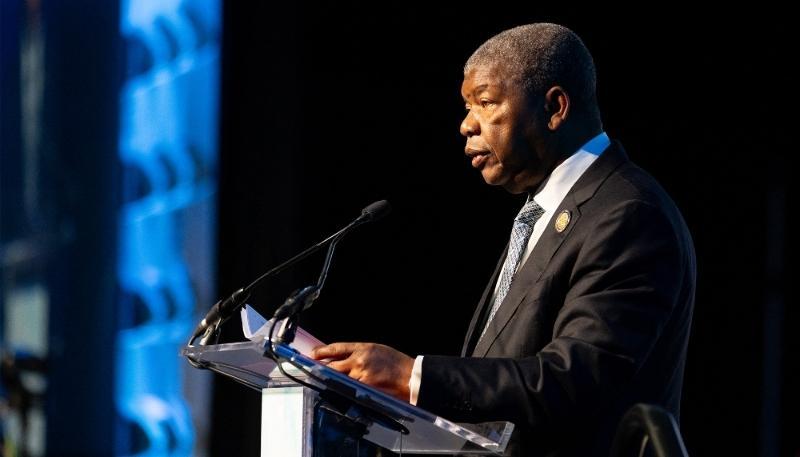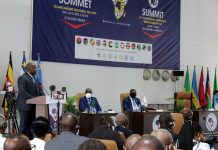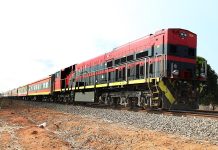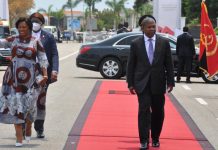Africa-Press – Angola. The outgoing Chairperson of the International Conference on the Great Lakes Region (ICGLR), João Lourenço, highlighted, on Saturday in Kinshasa, the progress achieved until December 2024, in the search for peace in the region, the result of the diplomatic and political work developed.
Speaking at the opening of the organization’s 9th Summit of Heads of State and Government, he pointed to the preparation and approval of the Joint Roadmap for Peace in the Central African Republic.
João Lourenço stated that the aforementioned roadmap defines six priority areas, such as engagement with leaders of armed groups, ceasefire, disarmament and reintegration, reform of the defense and security sector, border control and the political process with reestablishment of State authority.
He also spoke about advocacy at the United Nations, which resulted in the lifting of the arms embargo imposed on the Central African Republic and the approval of the ICGLR Roadmap for the pacification of Eastern DRC, accompanied by the Joint Plan for resolving the security crisis and normalizing relations between DRC and Rwanda.
Among the gains, he also listed the holding of seven ministerial meetings between the DRC and Rwanda, supported by technical meetings, throughout 2024, as well as the presentation of a proposal for a peace agreement to relaunch dialogue in the East of the DRC;
The list, according to the Angolan statesman, also includes the adoption of the Concept of Operations (CONOPS), which guides the neutralization of the FDLR and the disengagement of forces, as well as the holding of the 10th Extraordinary Summit on Peace and Security in the region, in Luanda, on June 3, 2023.
President João Lourenço also highlighted the implementation of the Ad-Hoc Verification Mechanism in Goma, in November 2022, and the subsequent launch of the Reinforced Ad-Hoc Verification Mechanism, in November 2024.
Finally, he highlighted the agreement for a ceasefire in Eastern DRC, in force since August 4, 2024.
The President considered that these results confirm the effectiveness of the principle that African problems must find solutions within the continent itself.
He highlighted that, with adequate resources and political will, it is possible to face the most complex challenges and build sustainable peace for current and future generations.
In addition to focusing on Peace and Security issues, he said that Angola, during its presidency, also made efforts in the field of social and economic development, convinced that a developed society is a prerequisite for stability in the region.
He said that he also paid attention to the importance of youth and women, as pillars of the development of our countries.
President João Lourenço maintained that it was in this context that Angola, reaffirming its commitment to promoting peace, security and gender equality, hosted in October 2024 the High-Level Women’s Forum of the Great Lakes Region, focusing on the importance of involving women in all stages of peace processes.
He recalled that the role of women in building peace is an unquestionable reality and their involvement is essential, given their relevance in the dynamics of communities, their direct experience with the impact of conflicts and their ability to promote dialogue and reconciliation.
In this sense, he asserted that it is essential to prepare and disseminate the ICGLR Regional Action Plan on Resolution 1325 of the United Nations Security Council on Women, Peace and Security.
Challenges
However, he admitted that the Great Lakes Region still faces significant challenges in the areas of peace and security, the direct consequence of which is the increase in refugees and internally displaced people.
According to the Head of State, these constraints require collective efforts from member countries, including stricter governance of natural resources, with a view to combating the illicit trade in minerals.
The President explained that, although security was the central axis of his mandate, the Angolan presidency also integrated the economic vectors, regional development and improving the functioning of the ICGLR Secretariat.
He recalled that all of Angola’s actions were guided by the Pact on Peace, Stability and Development of the Region, aligned with the principles of International Law, the United Nations Charter and the Constitutive Act of the African Union.
João Lourenço reiterated the principle that “African solutions to African problems” constitute the safest path to lasting stability, without prejudice to extracontinental initiatives that support peace efforts.
He emphasized, however, that these initiatives must be linked to African mechanisms, namely the Luanda and Nairobi Processes.
The Summit will be marked by the handover of the Angolan Presidency to the DRC, after five years of leading the ICGLR’s destinies.
The ICGLR is an intergovernmental organization created based on the recognition of the regional dimension of political instability and conflicts experienced in the region’s Member States and which require a concerted effort to promote sustainable peace and development.
It currently consists of 12 countries (Angola, Burundi, Central African Republic, Congo, DRC, Kenya, Uganda, Rwanda, South Sudan, Sudan, Tanzania and Zambia) that meet at a summit, at the level of heads of State and Government, every two years.
For More News And Analysis About Angola Follow Africa-Press






